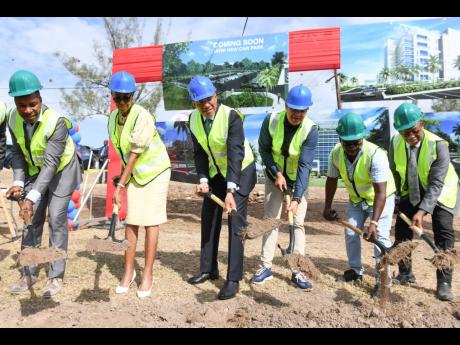PM emphasises equity, fairness in public spending
... as UHWI kick-starts transformation with Ring Road project
Since campaigning for the local government elections, Prime Minister Andrew Holness says the reality of the devastating impact climate change will have on the lives of many Jamaicans has hit him hard.
“As I travel the country on the campaign trail, you can see that we have chosen to live in areas that are going to be under threat from climate change. We have chosen to live in areas where you are going to have landslides. The nature of the soil is changing because we have cut down trees and we haven’t taken all the environmental protection precautions, and so in the next 50 years of our development as a nation, we’re going to be looking very carefully at our spatial development,” Holness said.
The prime minister was speaking at the symbolic groundbreaking ceremony for the Ring Road Re-routing Project at the University Hospital of the West Indies (UHWI) in St Andrew on Tuesday.
Some $278 million is being spent to kick-start the project, which is seen as a key infrastructure enhancement that will facilitate the phased development of five medical towers on the hospital’s grounds. These high-rise towers are part of the hospital’s strategic initiative to upgrade existing medical facilities to accommodate the growing healthcare needs of the public over the medium to long term.
“In a microcosm of this, the University Hospital of the West Indies has now been forced into doing this (making changes by creating new buildings suitable to work in). As they look to the next 50 years of their development and the land space that they have, they’re going to have to figure out all these dispersed buildings that they have all over the place, connected by open corridors. That is not going to work, so you’re going to have to go knock down some of those buildings and consolidate in more modern structures,” Holness said.
He applauded the administrators of the UHWI for embarking on the project and stressed the need for other Jamaicans to embrace change.
“To get some people to agree to change, sometimes you have to physically show them what the change will be like,” Holness said. “I want to use the opportunity to say to Jamaica that the way in which our country has developed from a physical built environmental point of view, it is not sustainable.”
BUILDING TO BE DEMOLISHED
There is an existing building that housed emergency medical personnel on the grounds of the UHWI that will be knocked down, making way for the new infrastructure with more equity.
Holness said that one value he brings as prime minister is to ensure that equity remains in society.
“That is what it really comes down to. Every decision that we make to spend, I examine ‘what is the equity?’, meaning how is it going to be fair to all stakeholders. Will this decision make everybody better off and not one person worse off, and if some people are going to be made worse off, how do we compensate them?” Holness said.
“That is what you hire your politicians to do – to maintain equity in the society,” he added.
Noting that critics could question why such an investment should be made in the UHWI as opposed to other hospitals in the capital city, such as the Kingston Public Hospital (KPH), Holness had words to hit back.
“What is the equity of this expenditure? [It will cost] $278 million to build the facility here and billions to [complete] this (the overall project), and this is a paying institution. Why not spend it on KPH?” Holness said.
“I’m saying this to you, ‘You may not have considered it, [but] on the surface of it, you don’t think of that, but every public expenditure decision, I look at it, every one of them, because we have an unequal society, and yes, it had its roots in slavery, and it had its roots in colonialism. It had its roots now in modern times in poor government; governments that made decisions about public expenditure that did not consider equity and fairness,” he said.
“I didn’t come into politics for aggrandizement. I just came into politics because I saw people just being misled, even people who should know better, and I decided that when I’m there, I’m not going to mislead the people. I’m the only politician who has told you how it is, and I’ve paid the price. I’ve paid the price, and I haven’t changed my ways. I’m going to tell you how it is,” Holness added.
“We acknowledge that under normal circumstances, it would have been better to have spent the resources on KPH, but because we have strategic reasons, we are spending here,” he said.
Holness said that at another time, Health and Wellness Minister Dr Christopher Tufton will outline future plans for KPH, which is also in dire straits.
The prime minister said that the Government is making a massive public investment in the renovation of the Cornwall Regional Hospital, after which the focus will be shifted to the KPH.

